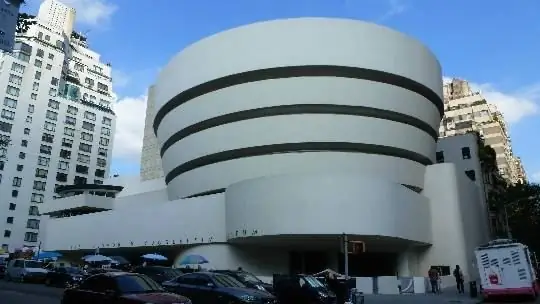
Description of the attraction
The Solomon Guggenheim Museum on Fifth Avenue is one of the largest and most famous collections of contemporary art in the world. His story is a vivid example of the possibilities of private initiative, inspired by the love of art.
The museum was founded by a very wealthy businessman, collector and philanthropist Solomon Guggenheim. The offspring of an immigrant family who made a fortune in lead, silver and copper mines, Solomon mined gold in Alaska. At the end of the 19th century, this workaholic, who worked around the clock, began collecting works of old masters. After World War I, he left the business to focus on collecting. A decisive role in shaping the views of the Guggenheim was played by a meeting with the German artist Baroness Hilla von Ribey, who introduced the patron to abstract art. An avid collector herself, she became a friend and advisor to the Guggenheim, who now devoted his life to collecting works of contemporary art.
In 1937, the patron founded the Guggenheim Foundation, and two years later opened his first Museum of Non-Objective Painting in a rented apartment in Manhattan. In his collection there were already canvases by Kandinsky, Mondrian, Chagall, Leger, Picasso. The collection grew rapidly, and in 1943 Hilla Ribey asked the great Frank Lloyd Wright to design a special building for the museum. Wright took this idea seriously. Work on the project lasted 15 years, but the museum building was opened in October 1959, after the death of the architect. The Guggenheim himself did not see the museum either: he died in the late forties.
Wright created a cylindrical, upward-expanding building in downtown Manhattan, which he interpreted as a "temple of the spirit." According to the architect's plan, visitors to the museum must first take an elevator under the roof of the building, and then go down a continuous spiral ramp, inspecting the exposition along the way. Public opinion did not immediately accept Wright's idea. Artists have even signed petitions against the corkscrew design.
Nevertheless, the museum is now visited by about three million people a year. It has first-class collections of Impressionist, Post-Impressionist, non-figurative painting and sculpture. Here are the works of modernist sculptors - Constantin Brancusi, Jean Arp, Alexander Calder (the founder of kinetic sculpture), Alberto Giacometti. At the same time, the museum has the true masterpieces of Paul Gauguin ("Man and Horse"), Edouard Manet ("In Front of the Mirror", "Woman in Evening Dress"), Camille Pizarro ("The Hermitage in Pontoise"), Vincent Van Gogh ("Snow landscape”,“Mountains at Saint-Remy”), Pablo Picasso (“Fourteenth of July”,“Three Bathers”). The collection here includes about 150 works by Wassily Kandinsky.
Unlike many museums, the Guggenheim does not divide its collection into sections dedicated to eras and styles. The collection is conceived and exhibited as a whole, which is constantly replenished with works of new talents - often paradoxical.






